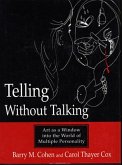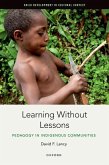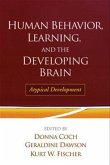Living Without an Amygdala
Herausgeber: Amaral, David G; Adolphs, Ralph
Living Without an Amygdala
Herausgeber: Amaral, David G; Adolphs, Ralph
- Gebundenes Buch
- Merkliste
- Auf die Merkliste
- Bewerten Bewerten
- Teilen
- Produkt teilen
- Produkterinnerung
- Produkterinnerung
Bringing together leading researchers, this book comprehensively covers what is known about the amygdala, with a unique focus on what happens when this key brain region is damaged or missing. Offering a truly comparative approach, the volume presents research on rats, monkeys, and humans.
Andere Kunden interessierten sich auch für
![Divorced, Without Children Divorced, Without Children]() Debra D CastaldoDivorced, Without Children196,99 €
Debra D CastaldoDivorced, Without Children196,99 €![Telling Without Talking: Art as a Window Into the World of Multiple Personality Telling Without Talking: Art as a Window Into the World of Multiple Personality]() Barry M. CohenTelling Without Talking: Art as a Window Into the World of Multiple Personality49,99 €
Barry M. CohenTelling Without Talking: Art as a Window Into the World of Multiple Personality49,99 €![Trauma and Pain Without a Subject Trauma and Pain Without a Subject]() Juan-Eduardo TesoneTrauma and Pain Without a Subject194,99 €
Juan-Eduardo TesoneTrauma and Pain Without a Subject194,99 €![Learning Without Lessons Learning Without Lessons]() David F LancyLearning Without Lessons108,99 €
David F LancyLearning Without Lessons108,99 €![Human Behavior, Learning, and the Developing Brain Human Behavior, Learning, and the Developing Brain]() Human Behavior, Learning, and the Developing Brain86,99 €
Human Behavior, Learning, and the Developing Brain86,99 €![The context of body image in adults with and without eating disorders. The context of body image in adults with and without eating disorders.]() Vivienne LewisThe context of body image in adults with and without eating disorders.53,99 €
Vivienne LewisThe context of body image in adults with and without eating disorders.53,99 €![Presenting Without Pandering - Self-Marketing for Creatives Presenting Without Pandering - Self-Marketing for Creatives]() Alina GausePresenting Without Pandering - Self-Marketing for Creatives29,95 €
Alina GausePresenting Without Pandering - Self-Marketing for Creatives29,95 €-
Bringing together leading researchers, this book comprehensively covers what is known about the amygdala, with a unique focus on what happens when this key brain region is damaged or missing. Offering a truly comparative approach, the volume presents research on rats, monkeys, and humans.
Hinweis: Dieser Artikel kann nur an eine deutsche Lieferadresse ausgeliefert werden.
Hinweis: Dieser Artikel kann nur an eine deutsche Lieferadresse ausgeliefert werden.
Produktdetails
- Produktdetails
- Verlag: Guilford Publications
- Seitenzahl: 430
- Erscheinungstermin: 13. Juni 2016
- Englisch
- Abmessung: 236mm x 156mm x 35mm
- Gewicht: 748g
- ISBN-13: 9781462525942
- ISBN-10: 1462525946
- Artikelnr.: 43917648
- Herstellerkennzeichnung
- Libri GmbH
- Europaallee 1
- 36244 Bad Hersfeld
- gpsr@libri.de
- Verlag: Guilford Publications
- Seitenzahl: 430
- Erscheinungstermin: 13. Juni 2016
- Englisch
- Abmessung: 236mm x 156mm x 35mm
- Gewicht: 748g
- ISBN-13: 9781462525942
- ISBN-10: 1462525946
- Artikelnr.: 43917648
- Herstellerkennzeichnung
- Libri GmbH
- Europaallee 1
- 36244 Bad Hersfeld
- gpsr@libri.de
David G. Amaral, PhD, is Distinguished Professor of Psychiatry and Neuroscience and Research Director of the UC Davis MIND Institute at the University of California, Davis. His interests include the neurobiology of social behavior and the development, neuroanatomical organization, and plasticity of the primate and human amygdala and hippocampal formation, with a particular focus on understanding the biological bases of autism spectrum disorder. Dr. Amaral is Director of Autism BrainNet, which solicits postmortem brain tissue to facilitate autism research, and Editor-in-Chief of Autism Research. He is a past president of the International Society for Autism Research and a Fellow of the American Association for the Advancement of Science, among other honors. Ralph Adolphs, PhD, is Bren Professor of Psychology and Neuroscience at the California Institute of Technology. He leads a social neuroscience laboratory that investigates the psychological and neurobiological underpinnings of social behavior, with a particular focus on the role of the human amygdala and prefrontal cortex. A major goal is to make comparisons and contrasts across different clinical populations and research techniques. Dr. Adolphs is a past president of the Association for the Scientific Study of Consciousness, a Fellow of the Association for Psychological Science, and a recipient of the Distinguished Investigator Award from the Social and Affective Neuroscience Society, among other honors.
1. A Tale of Survival from the World of Patient S. M.
Justin S. Feinstein
Ralph Adolphs
& Daniel Tranel 2. A Synopsis of Primate Amygdala Neuroanatomy
Cynthia M. Schumann
Martha V. Vargas
& Aaron Lee 3. A Short History of the Lesion Technique for Probing Amygdala Function
David G. Amaral 4. Role of the Rodent Amygdala in Early Development
Emma Sarro & Regina M. Sullivan 5. Foraging in the Face of Fear: Novel Strategies for Evaluating Amygdala Functions in Rats
Jeansok J. Kim
June-Seek Choi
& Hongjoo J. Lee 6. Lifetime Consequences of Early Amygdala Damage in Rhesus Monkeys
Eliza Bliss-Moreau
Gilda Moadab
& David G. Amaral 7. The Effects of Neonatal Amygdala Lesions in Rhesus Monkeys Living in a Species-Typical Social Environment
Jocelyne Bachevalier
Mar Sanchez
Jessica Raper
Shannon B. Z. Stephens
& Kim Wallen 8. The Central Nucleus of the Amygdala Is a Critical Substrate for Individual Differences in Anxiety
Jonathan A. Oler
Andrew S. Fox
Alexander J. Shackman
& Ned H. Kalin 9. Monkeys without an Amygdala
Elisabeth A. Murray & Sarah E. V. Rhodes 10. Consequences of Developmental Bilateral Amygdala Lesions in Humans
Ralph Adolphs 11. Behavioral Consequences and Compensatory Adaptations after Early Bilateral Amygdala Damage in Monozygotic Twins
Alexandra Patin & René Hurlemann 12. Consequences of Selective Bilateral Lesions to the Basolateral Amygdala in Humans
Jack van Honk
David Terburg
Helena Thornton
Dan J. Stein
& Barak Morgan 13. Attending to the World without an Amygdala
Rebecca M. Todd
Adam K. Anderson
& Elizabeth A. Phelps 14. Implications for Understanding Amygdala Function in Mental Disorders
Christopher S. Monk & Daniel S. Pine Epilogue
David G. Amaral & Ralph Adolphs Index
Justin S. Feinstein
Ralph Adolphs
& Daniel Tranel 2. A Synopsis of Primate Amygdala Neuroanatomy
Cynthia M. Schumann
Martha V. Vargas
& Aaron Lee 3. A Short History of the Lesion Technique for Probing Amygdala Function
David G. Amaral 4. Role of the Rodent Amygdala in Early Development
Emma Sarro & Regina M. Sullivan 5. Foraging in the Face of Fear: Novel Strategies for Evaluating Amygdala Functions in Rats
Jeansok J. Kim
June-Seek Choi
& Hongjoo J. Lee 6. Lifetime Consequences of Early Amygdala Damage in Rhesus Monkeys
Eliza Bliss-Moreau
Gilda Moadab
& David G. Amaral 7. The Effects of Neonatal Amygdala Lesions in Rhesus Monkeys Living in a Species-Typical Social Environment
Jocelyne Bachevalier
Mar Sanchez
Jessica Raper
Shannon B. Z. Stephens
& Kim Wallen 8. The Central Nucleus of the Amygdala Is a Critical Substrate for Individual Differences in Anxiety
Jonathan A. Oler
Andrew S. Fox
Alexander J. Shackman
& Ned H. Kalin 9. Monkeys without an Amygdala
Elisabeth A. Murray & Sarah E. V. Rhodes 10. Consequences of Developmental Bilateral Amygdala Lesions in Humans
Ralph Adolphs 11. Behavioral Consequences and Compensatory Adaptations after Early Bilateral Amygdala Damage in Monozygotic Twins
Alexandra Patin & René Hurlemann 12. Consequences of Selective Bilateral Lesions to the Basolateral Amygdala in Humans
Jack van Honk
David Terburg
Helena Thornton
Dan J. Stein
& Barak Morgan 13. Attending to the World without an Amygdala
Rebecca M. Todd
Adam K. Anderson
& Elizabeth A. Phelps 14. Implications for Understanding Amygdala Function in Mental Disorders
Christopher S. Monk & Daniel S. Pine Epilogue
David G. Amaral & Ralph Adolphs Index
1. A Tale of Survival from the World of Patient S. M.
Justin S. Feinstein
Ralph Adolphs
& Daniel Tranel 2. A Synopsis of Primate Amygdala Neuroanatomy
Cynthia M. Schumann
Martha V. Vargas
& Aaron Lee 3. A Short History of the Lesion Technique for Probing Amygdala Function
David G. Amaral 4. Role of the Rodent Amygdala in Early Development
Emma Sarro & Regina M. Sullivan 5. Foraging in the Face of Fear: Novel Strategies for Evaluating Amygdala Functions in Rats
Jeansok J. Kim
June-Seek Choi
& Hongjoo J. Lee 6. Lifetime Consequences of Early Amygdala Damage in Rhesus Monkeys
Eliza Bliss-Moreau
Gilda Moadab
& David G. Amaral 7. The Effects of Neonatal Amygdala Lesions in Rhesus Monkeys Living in a Species-Typical Social Environment
Jocelyne Bachevalier
Mar Sanchez
Jessica Raper
Shannon B. Z. Stephens
& Kim Wallen 8. The Central Nucleus of the Amygdala Is a Critical Substrate for Individual Differences in Anxiety
Jonathan A. Oler
Andrew S. Fox
Alexander J. Shackman
& Ned H. Kalin 9. Monkeys without an Amygdala
Elisabeth A. Murray & Sarah E. V. Rhodes 10. Consequences of Developmental Bilateral Amygdala Lesions in Humans
Ralph Adolphs 11. Behavioral Consequences and Compensatory Adaptations after Early Bilateral Amygdala Damage in Monozygotic Twins
Alexandra Patin & René Hurlemann 12. Consequences of Selective Bilateral Lesions to the Basolateral Amygdala in Humans
Jack van Honk
David Terburg
Helena Thornton
Dan J. Stein
& Barak Morgan 13. Attending to the World without an Amygdala
Rebecca M. Todd
Adam K. Anderson
& Elizabeth A. Phelps 14. Implications for Understanding Amygdala Function in Mental Disorders
Christopher S. Monk & Daniel S. Pine Epilogue
David G. Amaral & Ralph Adolphs Index
Justin S. Feinstein
Ralph Adolphs
& Daniel Tranel 2. A Synopsis of Primate Amygdala Neuroanatomy
Cynthia M. Schumann
Martha V. Vargas
& Aaron Lee 3. A Short History of the Lesion Technique for Probing Amygdala Function
David G. Amaral 4. Role of the Rodent Amygdala in Early Development
Emma Sarro & Regina M. Sullivan 5. Foraging in the Face of Fear: Novel Strategies for Evaluating Amygdala Functions in Rats
Jeansok J. Kim
June-Seek Choi
& Hongjoo J. Lee 6. Lifetime Consequences of Early Amygdala Damage in Rhesus Monkeys
Eliza Bliss-Moreau
Gilda Moadab
& David G. Amaral 7. The Effects of Neonatal Amygdala Lesions in Rhesus Monkeys Living in a Species-Typical Social Environment
Jocelyne Bachevalier
Mar Sanchez
Jessica Raper
Shannon B. Z. Stephens
& Kim Wallen 8. The Central Nucleus of the Amygdala Is a Critical Substrate for Individual Differences in Anxiety
Jonathan A. Oler
Andrew S. Fox
Alexander J. Shackman
& Ned H. Kalin 9. Monkeys without an Amygdala
Elisabeth A. Murray & Sarah E. V. Rhodes 10. Consequences of Developmental Bilateral Amygdala Lesions in Humans
Ralph Adolphs 11. Behavioral Consequences and Compensatory Adaptations after Early Bilateral Amygdala Damage in Monozygotic Twins
Alexandra Patin & René Hurlemann 12. Consequences of Selective Bilateral Lesions to the Basolateral Amygdala in Humans
Jack van Honk
David Terburg
Helena Thornton
Dan J. Stein
& Barak Morgan 13. Attending to the World without an Amygdala
Rebecca M. Todd
Adam K. Anderson
& Elizabeth A. Phelps 14. Implications for Understanding Amygdala Function in Mental Disorders
Christopher S. Monk & Daniel S. Pine Epilogue
David G. Amaral & Ralph Adolphs Index








